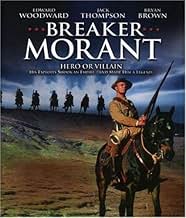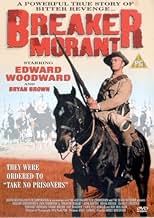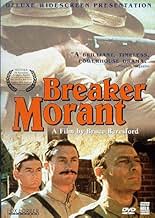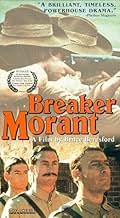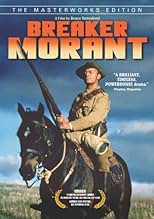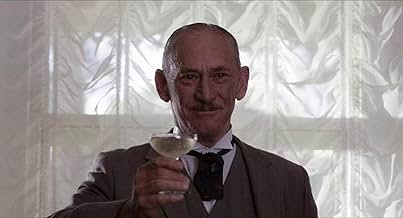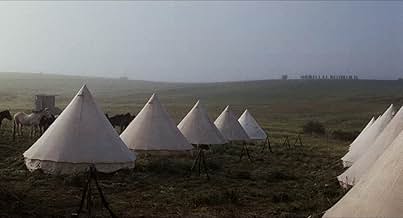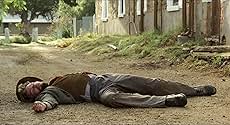AVALIAÇÃO DA IMDb
7,8/10
15 mil
SUA AVALIAÇÃO
Três tenentes australianos são julgados por executarem prisioneiros para desviar a atenção dos crimes de guerra cometidos por seus oficiais superiores.Três tenentes australianos são julgados por executarem prisioneiros para desviar a atenção dos crimes de guerra cometidos por seus oficiais superiores.Três tenentes australianos são julgados por executarem prisioneiros para desviar a atenção dos crimes de guerra cometidos por seus oficiais superiores.
- Direção
- Roteiristas
- Estrelas
- Indicado a 1 Oscar
- 13 vitórias e 8 indicações no total
Charles 'Bud' Tingwell
- Lt. Col. Denny
- (as Charles Tingwell)
Avaliações em destaque
(Note: Over 500 of my movie reviews are now available in my book "Cut to the Chaise Lounge or I Can't Believe I Swallowed the Remote!" Get it at Amazon.)
The question raised in this film is the same as that raised in the Nuremberg trials following World War II and at the trial of Lt. William Calley during the Vietnam War, namely should a soldier be punished for following orders?
The answer to that question depends not only on what the orders were--that is, were they legitimate orders consistent with the "rules of war"--but also on who is asking the question and why they are asking it. After WWII the Allies asked the question and the reason they asked it was because so many people were horrified by Nazi atrocities and wanted someone to punish. If the Axis powers had somehow won the war they might have tried US President Harry S Truman and others for the atomic bombings of the Japanese cities, or indeed for the fire bombings of Dresden. In Vietnam we asked the question of ourselves during the war because our government and military were being accused both at home and abroad of waging a unjustified war and going against our own value system.
Here the story goes back to the Boer War a hundred years ago in South Africa, as the British command for political reasons puts Lt. Breaker Morant, an Australian soldier fighting with the British forces, and two of his fellow Bushveldt Carbineers on trial for shooting Boer prisoners. Their defense is the same as the Nazi soldiers and that of Lt. Calley: they were just following orders.
The superb direction by Bruce Beresford (from the play by Kenneth Ross) makes us identify with Morant (Edward Woodward), Lt. Peter Handcock (Bryan Brown) and the third soldier because we can see that the horrors of war pervert the usual logic of right and wrong so completely that we can appreciate what drove them to do what they did. Jack Thompson, playing defense attorney Major J. F. Thomas, expresses this when he tells the court that war changes us and that therefore the usual rules of conduct no longer apply. Incidentally this film is based on actual events.
Regardless of which side of this very vexing question you come down on, I can promise you will enjoy this outstanding film, winner of 10 Australian Film Institute Awards. In the annuals of war films and courtroom dramas this ranks with the best of them.
The question raised in this film is the same as that raised in the Nuremberg trials following World War II and at the trial of Lt. William Calley during the Vietnam War, namely should a soldier be punished for following orders?
The answer to that question depends not only on what the orders were--that is, were they legitimate orders consistent with the "rules of war"--but also on who is asking the question and why they are asking it. After WWII the Allies asked the question and the reason they asked it was because so many people were horrified by Nazi atrocities and wanted someone to punish. If the Axis powers had somehow won the war they might have tried US President Harry S Truman and others for the atomic bombings of the Japanese cities, or indeed for the fire bombings of Dresden. In Vietnam we asked the question of ourselves during the war because our government and military were being accused both at home and abroad of waging a unjustified war and going against our own value system.
Here the story goes back to the Boer War a hundred years ago in South Africa, as the British command for political reasons puts Lt. Breaker Morant, an Australian soldier fighting with the British forces, and two of his fellow Bushveldt Carbineers on trial for shooting Boer prisoners. Their defense is the same as the Nazi soldiers and that of Lt. Calley: they were just following orders.
The superb direction by Bruce Beresford (from the play by Kenneth Ross) makes us identify with Morant (Edward Woodward), Lt. Peter Handcock (Bryan Brown) and the third soldier because we can see that the horrors of war pervert the usual logic of right and wrong so completely that we can appreciate what drove them to do what they did. Jack Thompson, playing defense attorney Major J. F. Thomas, expresses this when he tells the court that war changes us and that therefore the usual rules of conduct no longer apply. Incidentally this film is based on actual events.
Regardless of which side of this very vexing question you come down on, I can promise you will enjoy this outstanding film, winner of 10 Australian Film Institute Awards. In the annuals of war films and courtroom dramas this ranks with the best of them.
When I watched this finely acted movie, I wasn't really too knowledgeable about the Boer War so I didn't know how historically accurate the film was. However, from reading the posts, it seems more knowledgeable posters then myself agree that the filmmakers were very authentic in their endeavors. Most pertinently, even though the story is about the General Staff scapgoating the three Australian lieutenants to cover their own practice of ordering Boer prisoners shot, in a war obviously long since concluded, its relevance is timeless and universal as soldiers in all times and places are asked to do things that conflict with their consciences. Breaker Morant shows this very powerfully. 9/10.
"'Breaker' Morant" is based on true events, and deals with the court-martial of three subalterns during the closing stages of the Second Boer War (1899-1902). The officers are members of a mostly Australian unit called the Bushveldt Carbineers, created to fight the Boer commandos (in the original sense of the word) by employing their own tactics against them. The charges against them are that they committed murder by summarily executing captured Boers. That they have done so in not in question, but in their defence they argue that they were acting in accordance with standing orders, not least because the operational nature of the Carbineers would be hampered by having to keep prisoners under guard. The British command is keen to distance itself from this claim for various reasons; it might galvanise Boer resistance, and give Germany an excuse to provide material support to the Boers (thus extending a war which was already a serious drain on the British Empire's resources), and (though this is left unsaid in the film) cause discontent about the conduct of the war in those parts of the Empire supplying the manpower for the war, i.e. Britain, Australia and Canada. Instead, the British command clearly wishes to portray the three protagonists as "rogue elements" and sacrifice them for the sake of political expediency.
"'Breaker' Morant" is about injustice, hypocrisy and incomprehension. The injustice is not that lieutenants Morant, Hancock and Witton are innocent of the charges brought against them--they're not. The Second Convention of The Hague may have been only two years old at the time, but the custom of not killing prisoners was well-established long before, and at no point do we see any of the protagonists object to the standing orders. The injustice lies in the fact that the body which is trying them for their crimes--the British army--is the very body which ordered them to commit these crimes in the first place.
The incomprehension is that of the home front; in a brief flashback of Witton's relatives giving a going-away party, we see the expectation among the civilians that "our boys will knock 'em for six" but behave like gentlemen while doing so. Brief as the scene is, it is plain that the civilians understand only in the most abstract way, if they understand at all, that war is a messy business in which winning requires killing people in unpleasant ways. As Major Thomas, the protagonists' defence counsel, comments, "The barbarities of war are seldom committed by abnormal men. The tragedy of war is that these horrors are committed by normal men in abnormal situations." While I can agree with this observation, it does not alter the fact that the acts committed by the protagonists were of such a nature as to be have been formally outlawed, even within the context of war, two years previously.
Another trope, which occurs in this film but repeated in every war of the 20th century, is that "only a combat soldier can judge another combat soldier." As it happens, I am a former soldier (who never saw combat) who later helped prosecute war criminals while a civilian; I think this line is unadulterated bullsh*t. That said, this opinion comes with a caveat, which is that those civilians and non-combat soldiers who would pass judgement should understand that expecting soldiers to both fight cleanly and to win may be (and often are) mutually exclusive.
Of course, standards have changed somewhat since 1901; when Morant remarks "it's a new kind of war, George; it's a new war for a new century," the difference he indicates is that it is the first time white men visit atrocities upon each other which both had been quite content to inflict upon non-whites for most of the previous century. At one point in the film, Lt. Hancock pulls a dum-dum round from a Boer's ammunition pouch as an indication of the Boers' disregard for the laws of war. However, a (somewhat apocryphal) story from the opening stages of the Boer War (not in the film) tells of how the Boers lodged a protest with the British after finding dum-dum rounds in a killed British soldier's ammunition pouch; the British reportedly apologised profusely, explaining that the soldier had been issued these rounds in error, as these were intended only for use against blacks. The Boers accepted this explanation without further complaint.
But however you may feel about the politics underlying this film, it is a joy to watch. The quality of the production values is top notch, and had I not been familiar with Edward Woodward and Bryan Brown, I could have believed this film was made this year, rather than in 1980. The directing and acting are also superb. At the heart of this is the script, which carried no dead weight of unnecessary scenes; likely, this is due to the fact that it was originally written (and written well) for the stage. The story might easily be transposed to any number of conflicts since the Second Boer War in which military victory demands taking nasty measures; it could easily be rewritten to Iraq in 2003 ("Well, Peter, this is what comes of empire-building."), and for that reason it deserves more recognition than it's received. Magnificent; see it ASAP.
"'Breaker' Morant" is about injustice, hypocrisy and incomprehension. The injustice is not that lieutenants Morant, Hancock and Witton are innocent of the charges brought against them--they're not. The Second Convention of The Hague may have been only two years old at the time, but the custom of not killing prisoners was well-established long before, and at no point do we see any of the protagonists object to the standing orders. The injustice lies in the fact that the body which is trying them for their crimes--the British army--is the very body which ordered them to commit these crimes in the first place.
The incomprehension is that of the home front; in a brief flashback of Witton's relatives giving a going-away party, we see the expectation among the civilians that "our boys will knock 'em for six" but behave like gentlemen while doing so. Brief as the scene is, it is plain that the civilians understand only in the most abstract way, if they understand at all, that war is a messy business in which winning requires killing people in unpleasant ways. As Major Thomas, the protagonists' defence counsel, comments, "The barbarities of war are seldom committed by abnormal men. The tragedy of war is that these horrors are committed by normal men in abnormal situations." While I can agree with this observation, it does not alter the fact that the acts committed by the protagonists were of such a nature as to be have been formally outlawed, even within the context of war, two years previously.
Another trope, which occurs in this film but repeated in every war of the 20th century, is that "only a combat soldier can judge another combat soldier." As it happens, I am a former soldier (who never saw combat) who later helped prosecute war criminals while a civilian; I think this line is unadulterated bullsh*t. That said, this opinion comes with a caveat, which is that those civilians and non-combat soldiers who would pass judgement should understand that expecting soldiers to both fight cleanly and to win may be (and often are) mutually exclusive.
Of course, standards have changed somewhat since 1901; when Morant remarks "it's a new kind of war, George; it's a new war for a new century," the difference he indicates is that it is the first time white men visit atrocities upon each other which both had been quite content to inflict upon non-whites for most of the previous century. At one point in the film, Lt. Hancock pulls a dum-dum round from a Boer's ammunition pouch as an indication of the Boers' disregard for the laws of war. However, a (somewhat apocryphal) story from the opening stages of the Boer War (not in the film) tells of how the Boers lodged a protest with the British after finding dum-dum rounds in a killed British soldier's ammunition pouch; the British reportedly apologised profusely, explaining that the soldier had been issued these rounds in error, as these were intended only for use against blacks. The Boers accepted this explanation without further complaint.
But however you may feel about the politics underlying this film, it is a joy to watch. The quality of the production values is top notch, and had I not been familiar with Edward Woodward and Bryan Brown, I could have believed this film was made this year, rather than in 1980. The directing and acting are also superb. At the heart of this is the script, which carried no dead weight of unnecessary scenes; likely, this is due to the fact that it was originally written (and written well) for the stage. The story might easily be transposed to any number of conflicts since the Second Boer War in which military victory demands taking nasty measures; it could easily be rewritten to Iraq in 2003 ("Well, Peter, this is what comes of empire-building."), and for that reason it deserves more recognition than it's received. Magnificent; see it ASAP.
10chuck52
A war/courtroom drama on a par with The Caine Mutiny. Well written, acted and photographed without a single superfluous scene or conversation.I have watched it several times and it has always held my complete attention and has never failed to evoke pity and sympathy for the common soldier.
It's one of the most delightful experiences to watch a movie you know completely nothing about and it turns out to be one of the best surprises in a long time. This was the case with "Breaker' Morant". I dont even know why I bothered to watch it, since it sounded like a truly boring Australian war movie, but boy was I wrong and consequently glad I DID bother. Some of the acting and the script are truly Oscar-worthy and the photography and camera movements were truly outstanding on many occasions, taking the whole movie onto another level of experience. And not to forget, the poetry recited through the movie is brilliant. I wonder if it truly got published. 8/10
Você sabia?
- Curiosidades"We shot them under Rule 303" is a reference to the.0.303 inch (7.7 millimetre) cartridge used in British Army rifles.
- Erros de gravaçãoThe band plays an excerpt from Franz Lehár's The Merry Widow, which premiered three years after the trial took place.
- Citações
[last lines]
Harry Morant: Shoot straight, you bastards. - Don't make a mess of it!
- Cenas durante ou pós-créditosIntroducing Lewis Fitz-Gerald as George Witton.
- Trilhas sonorasAt Last
Traditional tune
Arranged by Jack Grimsley (uncredited)
Lyrics by H.H. Morant
Performed by Edward Woodward
Principais escolhas
Faça login para avaliar e ver a lista de recomendações personalizadas
Detalhes
- Data de lançamento
- País de origem
- Central de atendimento oficial
- Idiomas
- Também conhecido como
- 'Breaker' Morant
- Locações de filme
- Cactus Farm, Burra, South Australia, Austrália(deserted farmhouse, Boer attack)
- Empresas de produção
- Consulte mais créditos da empresa na IMDbPro
Bilheteria
- Orçamento
- AU$ 800.000 (estimativa)
- Faturamento bruto mundial
- US$ 948
Contribua para esta página
Sugerir uma alteração ou adicionar conteúdo ausente


